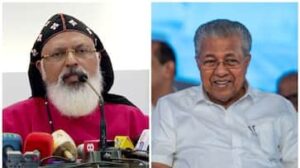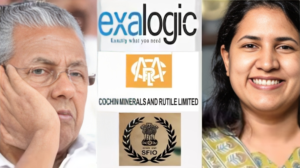Onmanorama Explains | Reasons for vice chancellors’ fall from grace in Kerala
[ad_1]
Priya Varghese, wife of Chief Minister Pinarayi Vijayan’s private secretary K K Ragesh, scoring top marks in the interview for associate professor of Malayalam in Kannur University was just one in a series of instances where people close to the ruling party, the CPM, were seen to land plum posts in varsities.
Priya at least has the cover of UGC Regulations 2018, which says that the selection will be based solely on the performance in the interview no matter the academic pedigree of contesting candidates. But in certain other recent appointments, there was not even the pretense of abiding by the law.
Take for instance the selection of assistant professor in the Malayalam department of Sree Sankaracharya University of Sanskrit, Kalady. Three subject experts who were part of the seven-member interview team openly questioned the first rank given to R Ninitha under the Muslim reservation category.

They said that the candidate was originally given fewer marks than was found in the rank list published by the university. Ninitha is the wife of CPM leader M B Rajesh, now the Kerala Assembly Speaker.
In the very same university, in another set of appointments, Vice Chancellor Dharmaraj Adat chose candidates who were rejected by the screening committee. This came to light when one of the screening committee members wrote to the Governor informing him how the selection process was subverted.
In yet another instance, a teacher who was debarred from examination duties by the Kerala University for his role in the 2019 PSC civil police officer recruitment fraud that saw SFI leaders scoring top ranks, was recently awarded the first rank in an assistant professor interview. This interview is now under the Supreme Court’s scanner.
Then there was the Kerala University’s choice for the editor-in-chief of the Malayalam Lexicon. The candidate was a Sanskrit scholar but had not studied Malayalam. It was said that she was not fluent in Malayalam either. She resigned when the Governor, as Chancellor, called her for an interview. She is the wife of the officer on special duty in the Chief Minister’s office.
This is not all. There are many other appointments of wives and close relatives of CPM leaders to various teaching posts in universities where it is alleged merit was shoved aside with the active connivance of no less an authority than a vice-chancellor.

Chancellor’s fury
It looked like nepotism was becoming the norm until Kannur Vice Chancellor Gopinath Ravindran decided to go ahead with the appointment of Priya Varghese in defiance of Kerala Governor Arif Mohammed Khan. This was the point when Khan decided enough was enough. The Governor not just stayed Priya’s appointment but also instituted a probe into the appointments to various posts in universities in the past three years.
Realising that the Governor could undo the advantage of having its own men as vice-chancellors in universities, the LDF government is making a swift countermove.

Law to keep VCs in thrall
The government is about to table the University Laws (Amendment) Bill, 2022, which will reduce the Governor’s say in the appointment of vice-chancellors. As per existing laws, the ‘search committee’ for the selection of VCs has three members; a nominee each of the Governor, the University Senate and the chairman of the UGC.
The new bill will add two more nominees affiliated to the Kerala government; the vice chairman of Kerala State Higher Education Council and a Syndicate nominee. This will give the state government a majority in the ‘search committee’, rendering the Governor’s likes or dislikes irrelevant.
Even as it stands, the state government has the upper hand as the Governor’s nominee has been traditionally chosen by the state. However, Khan’s aggressive ways have given rise to concerns that he might insist on a nominee of his choice. If this happens, the Governor’s man and the Centre’s UGC nominee together would have a majority in the three-member ‘search committee’. The new Bill, therefore, is an attempt to thwart any move to take the vice chancellor out of the control of the state government.

Vice of loyalty
“This desire to have a pliable vice chancellor is not just a CPM trait. Even under the UDF, vice chancellors were chosen on the basis of their caste or religion and, more importantly, for their loyalty,” said professor M N Karassery, who had retired as head of the department of Malayalam, Calicut University. “Before settling on a name, it is quite common for politicians to assess who among the candidates will do their bidding without asking questions,” he added.
According to Karassery, things got worse after Pinarayi Vijayan came to power. “Now, the VCs and pro-VCs and registrars are being used to get things done in the most shameless manner. Appointments of close relatives and children of friends and even drivers have become so rampant that we have stopped noticing,” he said.
Karassery termed as “the height of arrogance” the appointment of a person with no expertise in Malayalam as the chief editor of the Malayalam Lexicon. “It was like saying we will do as we please,” Karassery said.

VC as a job seeker
Former Kerala University Pro Vice-Chancellor J Prabhash said that the fall in the VC’s stature happened in the nineties, after the introduction of neoliberal policies. “The old value system was lost. Personal gain became the sole driving force. Such a philosophy governed the appointments of VCs, too,” Prabhash said. “Till then, even if VCs had political leanings, they were men of great stature who could not be influenced by people in power. Now, it is not academic credentials but just loyalty. And this too, not loyalty to the party but loyalty to the leader,” he said.
There was also a time when a VC post was not advertised like it is today. “We sought out the most eminent academicians and actively wooed them. Now, it is the other way around. Anyone can apply for the VC post and the shortlisted candidates, like in the case of any other ordinary job, are grilled by a panel. A VC post has been effectively downgraded,” Prabhash said.
Karassery remembers a time when giants like John Matthai, the legendary economist who was India’s first railway minister and then its finance minister, was Kerala University Vice Chancellor, and even a Chief Minister of the stature of E M S Namboodiripad had to take an appointment to meet him.
“Now we have vice-chancellors who will stand up and fumble with words when a minister’s PA calls,” a former University registrar said, half in jest.

Strictly confidential
There was a time when there were men of steel at all levels in the universities. An incident that took place at Calicut University will demonstrate this. It was the early seventies and Muhammad Gani was the vice-chancellor, its first. Gani was a person held in such awe that the then education minister C H Muhammad Koya had famously said that he had never dared to ask him for favours.
One day an old pal of Gani made a visit to the VC’s office. Gani was elated. When he realised that his friend’s daughter had just completed her MA in one of the affiliated colleges and was waiting for results, the VC picked up the phone and called his controller of examinations Chellappan Pillai.
In his stately voice, Gani told Pillai of his friend’s daughter, gave him her examination number and asked him to fetch the girl’s marks. There was a brief pause before Pillai replied. “This is a highly confidential matter. I am unable to share it with you sir before the results are officially published.”
Gani profusely apologised before putting down the phone.
Stifling of debate and dissent
Several professors Onmanorama talked to said that dissenting voices have become increasingly rare in university bodies like the senate, syndicate and academic councils.
“Most of these bodies are stuffed with party loyalists and have ceased to be academic bodies. The stranglehold of CPM-affiliated teachers’ and employees’ associations is so complete that it is their writ that runs through universities. Vice-chancellors desperate to hold on to their jobs defer to their wishes. I know of many qualified people who have refused to apply to senior faculty positions in our universities. They know they don’t stand a chance,” a serving associate professor said on condition of anonymity.
Falling standards of teaching are reflected in the growing interest among students to study abroad. A Ministry of External Affairs figure shows that 18 lakh Indian students, a large chunk of them from Kerala, will be studying in foreign universities by 2024.

What makes students fly
It is not just the lure of foreign education that is driving our students away. It is an indisputable fact that our universities are not doing enough. For instance take Kerala University, the state’s oldest and which now boasts of the highest NAAC (National Assessment and Accreditation Council) grading of A++.
The UGC had in January 2017 mandated that the syllabus should be revised every three years. A recent CAG investigation has noticed that the syllabus of 28 out of 142 courses have not been revised for a long time.
It has been 12 years since the syllabus of law was revised, seven years since Computer Science was revised, eight years since the syllabus of MSc Microbiology was revised, and 16 years since the syllabus of Master of Fine Arts course was revised.
On top of this is the increase in contract appointments. UGC regulations do not permit contract teachers to be more than 10 per cent of the total number of faculty positions of the college/university. In Kerala University, it is more than 23 per cent. And this trend of appointing contract teachers has caught on in the last few years. What was 14.08 per cent in 2017 is 23.49 in 2021.
The CAG audit has also observed that most contract staff did not have the qualifications mandated under the UGC regulations. It was found that 108 of the 174 teachers appointed in the 34 University Institutes of Technology (UITs) were appointed without NET/SET/PhD qualifications.
A namesake department
Here is a small nugget that would offer an insight into how Kerala University treats technologies of the future. The department of Nanoscience and Nanotechnology has been functioning since its establishment in 2016 without any sanctioned faculty post.
[ad_2]
Source link








